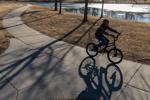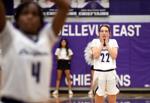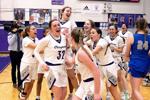Like millions of people around the world, Oleh Khalimonchuk has watched Russia’s invasion of Ukraine unfold with horror and disbelief.
“It’s just unfathomable,” he said. “It’s … really hard to comprehend and process. It’s just difficult.”
For Khalimonchuk, Russia’s invasion hits close to home. Now a biochemistry professor at the University of Nebraska-Lincoln and director of the Nebraska Redox Biology Center, Khalimonchuk spent the first 20 years of his life in western Ukraine, having grown up in the city of Lviv.
Now, after putting down roots in the United States, Khalimonchuk, 42, is looking to do what he can to help Ukrainians seek refuge from the invasion. On Feb. 27, he went on Twitter to offer fellowships at his lab in the UNL center to Ukrainian refugees trained in biochemistry.
Oleh Khalimonchuk, a biochemistry professor at the University of Nebraska-Lincoln and director of the Nebraska Redox Biology Center, has offered fellowships in his lab to Ukrainian refugees trained in biochemistry.
“As a (Ukrainian American), I can’t just stand aside while this atrocious act of Russian aggression on (Ukraine) unfolds. Happy to offer several short-/long-term lab fellowships for students/postdocs/senior scientists from Ukraine,” Khalimonchuk tweeted.
People are also reading…
He expects to offer about three or four fellowships to people who could include graduate students, postdoctoral researchers and senior scientists.
Although Khalimonchuk said Tuesday that he wrote his tweet as “more of an impulsive move,” it has gained traction, with more than 160 retweets and hundreds of likes.
“My entire life is here, basically, so I’m not looking to go back,” he said. “But I feel like I’m in a position where I can help those people.”
Refugees from the conflict reached 2 million Tuesday, the Associated Press reported, marking the fastest exodus Europe has seen since World War II.
It’s still premature to measure the impact and interest of Khalimonchuk’s offer, he said. But Lincoln offers a home away from home for Ukrainians. Lincoln’s population includes Ukrainians, along with their descendants, who fled from the country when it was part of the Soviet Union.
Accepted candidates also would work in a lab that includes Ukrainian native and senior research associate Iryna Bohovych and is managed by Khalimonchuk’s wife, Nataliya Zahayko, who also is from Lviv.
Khalimonchuk indicated that the fellowships could be funded by operational cost savings from the COVID-19 pandemic. He estimated that fellowship salaries will range from $27,000 to $48,000.
“If we can help people by offering them an opportunity to work here, it’s a win-win for everybody,” he said.
Khalimonchuk said fellows could work on multiple projects related to mitochondria research and diseases linked to mitochondrial dysfunctions.
As Khalimonchuk and his colleagues offer refuge, they also keep in touch with family members directly affected by the conflict.
A UNL press release noted that Khalimonchuk’s mother was forced to seek cover in a basement when an air raid siren began blaring. The release added that some members of Bohovych’s family were living in an area that has been bombarded by Russian airstrikes. They managed to escape to relative safety in the past week.
Despite the imminent dangers their families are facing, Khalimonchuk said he and his Ukrainian colleagues cannot convince their family members who remain in the country to move away.
“Our families have spent most of their lives in an area,” he said. “They don’t want to move.”
Our best Omaha staff photos & videos of March 2022

Gretna heard coach Brad Feeken talks to his team between quarters in the Millard North vs. Gretna boys basketball NSAA state semifinal game in Lincoln on Thursday. Millard North won the game 58-43.

Bellevue West’s Josiah Dotzler (22) gets caught between Omaha Creighton Prep’s Casey OMalley (10) and Joshua Townley-Thomas (21) in the Bellevue West vs. Omaha Creighton Prep boys basketball NSAA state semifinal game in Lincoln on Thursday.

Britt Prince, a sophomore and the state girls basketball scoring leader, in her home gym at Elkhorn North High School in Omaha on Thursday, March 03, 2022.

Omaha Central’s Ital Lopuyo (22) blocks a shots by Lincoln Southwest’s Alexa Gobel (21) in the Omaha Central vs. Lincoln Southwest girls basketball NSAA state quarterfinal game in Lincoln on Monday.

Sophie Wilson and her daughter Coco walk past “David with the Head of Goliath” on Wednesday.

Omaha firefighters battle a brush fire on the grass south of eastbound Interstate 80 on Wednesday. Traffic was restricted during that time.

Sebastian Moore, 11, rides his bike around the pond, still partially covered in ice, at Benson Park in Omaha on Tuesday. Highs were in the mid-70s Tuesday afternoon.

Creighton’s Ryan Kalkbrenner celebrates after scoring in the second half of their game against UConn at CHI Health Center in Omaha on Wednesday.

Bellevue East’s Mya Skoff (right) holds her face as Jayla Wilson shoots a free throw late in the 4th quarter of their A-7 district final against Millard North at Bellevue East High School in Bellevue on Tuesday.

Bellevue East players celebrate their A-7 district final win against Millard North at Bellevue East High School in Bellevue on Tuesday.

Creighton’s Ryan Kalkbrenner (left) battles UConn’s Adama Sanogo for a rebound during their game at CHI Health Center in Omaha on Wednesday.

Creighton’s Ryan Kalkbrenner dunks during their game against UConn at CHI Health Center in Omaha on Wednesday.